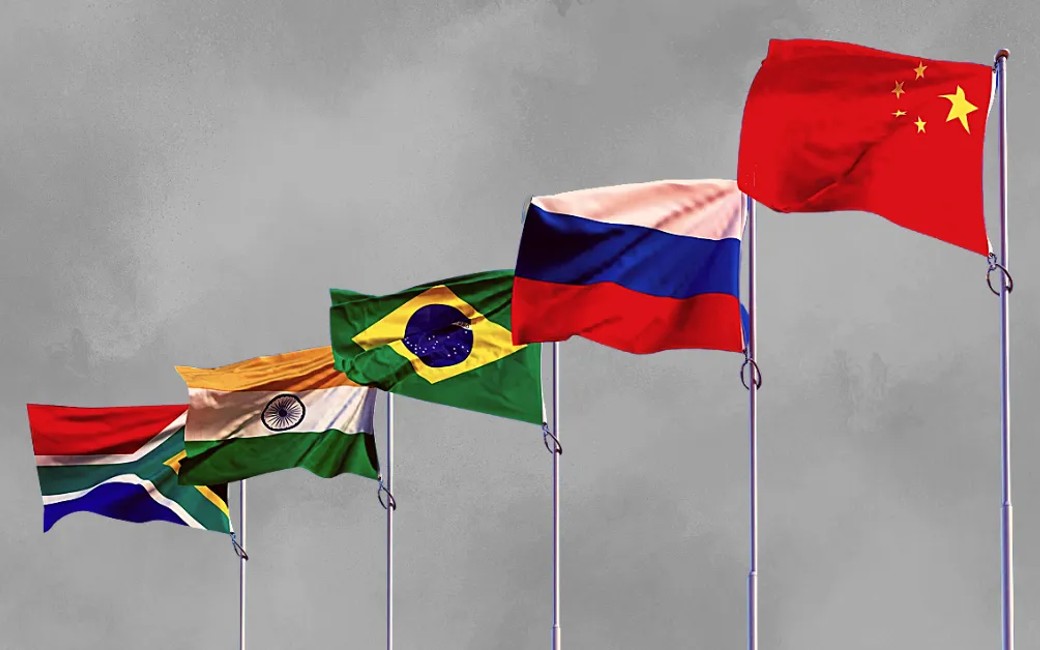The BRICS alliance could gain control of the majority of the world's oil and gas trade by including Saudi Arabia and the United Arab Emirates, which could lead to a shift away from the USD and the de-dollarization of the oil economy.
The Brics economic group, consisting of Brazil, Russia, India, China, and South Africa, is discussing the possibility of expanding its membership and promoting the use of local currencies for trade settlement, with aims to challenge the dominance of the US dollar, but analysts believe that the greenback is unlikely to lose its status as the international reserve currency.
Russia has called on the BRICS alliance to abandon the US dollar for trade settlements and instead embrace local currencies, in a continuation of the bloc's de-dollarization efforts.
Brazil's President proposed the creation of a common currency for BRICS nations to reduce their vulnerability to dollar exchange rate fluctuations, although officials and economists have acknowledged the challenges of such a project.
The BRICS New Development Bank is receiving applications from 15 countries to join, as it aims to lessen its dependence on the US dollar and prioritize local currency lending.
BRICS has officially invited six new countries, including Saudi Arabia, the UAE, Egypt, Argentina, Iran, and Ethiopia, to join the bloc, potentially expanding the alliance into an 11-member group called BRICS+, which could have a major impact on the global financial sector.
South Africa's finance minister says that the BRICS grouping will not replace international payment systems like SWIFT but will explore creating one that strengthens trade in local currencies.
The BRICS summit is aiming to reduce reliance on the U.S. Dollar, as the coalition confirms new members including UAE, Egypt, Ethiopia, Saudi Arabia, and Argentina, and discusses the possibility of a new payment system and currency backed by gold.
With major oil exporters joining BRICS, analysts suggest that the adoption of local currencies for trade among BRICS countries, rather than the US dollar, is becoming more natural, potentially reducing transaction costs and weakening the role of the petrodollar.
The BRICS summit focused on increasing the use of local currencies for trade, but there were no discussions about a digital currency; however, three non-BRICS countries also announced plans to use local currencies instead of the dollar for cross-border trade.
BRICS is considering making local currencies the only accepted form of payment for oil and gas settlements, which could potentially shift global power from the West to the East.
The BRICS nations are divided on the issue of de-dollarization, as statements from the bloc's leaders indicated, despite discussions about the creation of a common currency to rival the US dollar.
The BRICS expansion and their de-dollarization efforts have been met with a relatively calm response from the US, Germany, and the European Union, emphasizing the importance of countries choosing partnerships based on their national interests.
The extended BRICS alliance, which now includes six new countries, has a GDP in purchasing power parity (PPP) that accounts for more than one-third of the global economy, giving them the potential to control exports of oil to the West and influence trade settlement currency choices.
Creating a BRICS currency backed by gold is considered nonsensical by a former Bank of America strategist, as it would essentially be another gold derivative and would weaken individual currencies within the group.
The BRICS expansion, which includes countries like Saudi Arabia, the UAE, and Iran, has raised concerns in the U.S. and EU as it poses a threat to Western-dominated financial markets, while China's influence grows and the alliance aims for de-dollarization in global trade.
Brazil President Luiz Inacio Lula da Silva's proposal for a shared currency among the BRICS nations has been met with skepticism due to logistical and political challenges, with differing levels of enthusiasm among the other leaders and the dominant position of the US dollar in global trade.
The BRICS bloc, including countries like India, China, and Russia, is slowly reducing its dependency on the US dollar and using their local currencies for trade, which could potentially weaken the US dollar's position as the dominant global currency.
